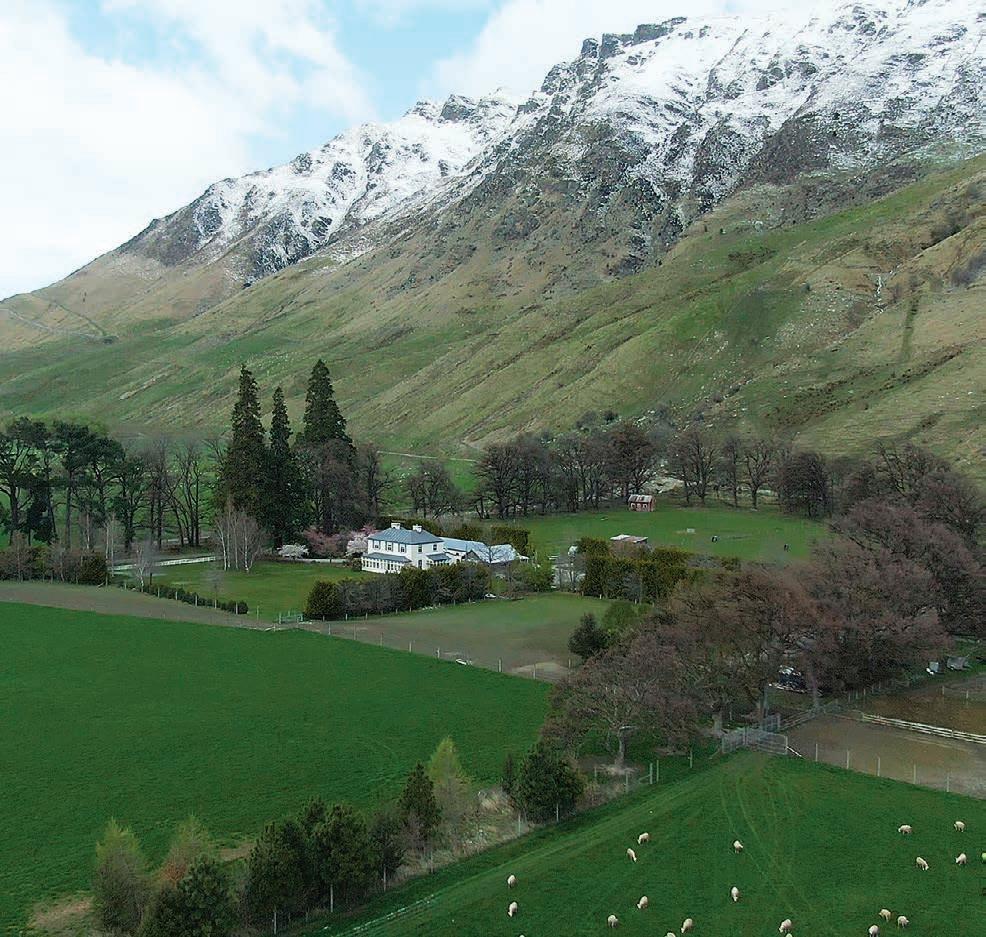
10 minute read
On Farm Story
On Farm Story Passion for farming, women’s empowerment
BOUNTIFUL: Deer graze on crops at Fairlight Station, Southland.

COUNTRY LIVING: The homestead at Fairlight Station, Southland.
Perriam kept her focused and the issues she was facing in perspective.
Their message was that despite being buffeted, her fundamental passion, purpose and focus remain unwavering.
Recruited by Great South, part of the Southland Regional Development Agency, she also kept busy talking to schools about dealing with covid-19 and was appointed a trustee of the Lumsden Medical Centre Board, which is fighting to have maternity services reinstated.
She was constantly looking for opportunities and realised that her knowledge and background lent itself to a business offering short-term workshops for secondary school students teaching farm skills
“I did everything and anything that I could to stay positive, to keep my profile up and to contribute to the wellbeing of others,” she said.
Then she received a phone call.
It was from Simon Wright, part owner and manager of Fairlight Station and father of Holly, who worked for Douglas at Real Country before covid-19.
“Simon asked what I was doing and I told him I was writing a business plan for one-day farming skill workshops that I hoped would be able to get some NCEA credits wrapped around,” she said.
“He said ‘we need to talk.’ That was a turning point.”
Wright, his wife Lou and majority farm owners Doug and Mari Harpur, had for some years wanted to establish a farm training facility on Fairlight Station near Garston in Northern Southland.
They wanted Douglas to manage the venture.
The Harpurs, who have extensive international business interests, also own Forest Creek Station at Peel Forest.
Douglas says the couple will establish a foundation to initially fund the training and provide the facilities for the one-year course for three women aged 21 and older.
There is no upper age limit, Douglas says, older women have life skills which can prove valuable.
In addition to the two NZ farms, the Harpurs have forestry, land development, hospitality and hunting and fishing interests in Canada and the USA.
Fairlight is 3800ha of which 500ha is arable, 2000ha is hill country and 1300ha forestry.
They carry 3300 hinds, 120 stags, 3000 weaners, 620 beef cattle, 25 bulls, 160 calves, 3600 crossbred ewes, 1000 hoggets, which will lamb this spring and some goats.
Douglas says the Harpurs are investing in farm training because of their philanthropic values but also because they want to get more women into farming.
The Fairlight Foundation is seeking charity status so additional funding can be sourced to fund future training.
The one-year course, which runs from January to December, is aimed at an age group that will not clash with other farming
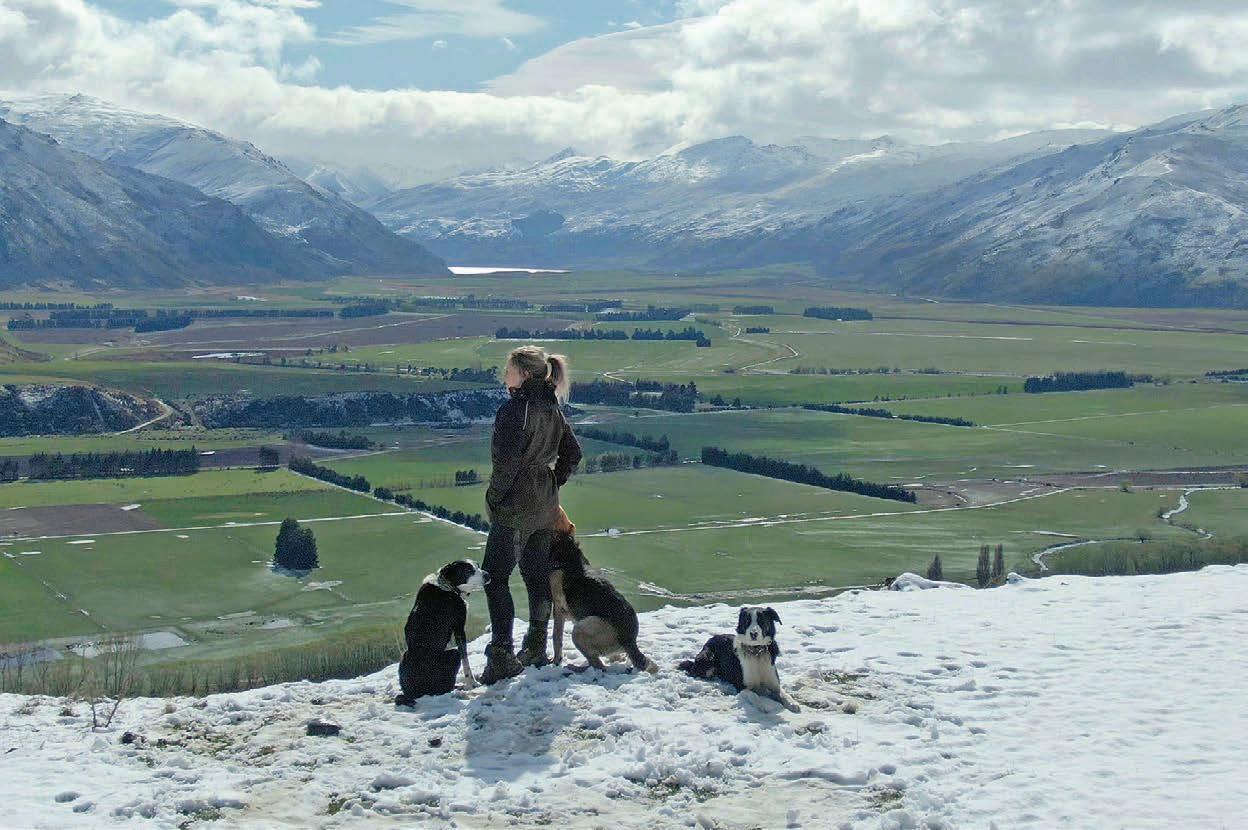
training institutions, which tend to focus on school leavers.
“They have given me an amazing opportunity,” she said.
“I want to remove every single barrier to women getting into the agricultural industry, including financial.”
I should never, ever have put on those stilettos when I had a corporate career, I should have worn gumboots.
This role is not only an extension of what Douglas has been doing for the last three years, but also fulfils her passion for promoting agriculture and passing on skills and life lessons to other women.
As part of the business plan, Douglas conducted a social media survey asking women what they wanted from the rural industry and how they would achieve that.
“What came back was nearly 400 respondents and those women were aged from 18 to 60, women who have had agricultural careers spanning 20 years through to 18-year-old school leavers,” she said.
Many wrote that they lacked the confidence to pursue the relevant skills while some relayed horrible experiences of bullying and abuse, which prompted them to leave the industry altogether.
“All the survey respondents told me having a female-only farm training facility is really important,” she said.
The foundation wants to provide more than just skilled farm workers, it wants to produce resilient, confident and strong women who will become role models and leaders.
Interns will spend a year living, working and learning on Fairlight Station with their living costs met and small stipend.
In addition, Douglas will arrange short courses others can attend, such as dog handling or fencing, which will be run by specialists.
Applications opened last week and Rural Women NZ president Fiona Gower has been recruited to help select the three interns who start their education on January 11.
Douglas will keep Real Country, which she hopes to resurrect for corporate and private functions and farm shows once the borders reopen.
But covid-19 has changed her perspective.
When she started Real Country, she wanted to create opportunities for women to help them grow in confidence, but she also measured success in the size of her bank account and assets.
“Now, my definition of success is all about the journey,” she said.
Success is also being measured in other ways.
“My life at the moment is amazing,” she said.
“My young dog is coming on nicely and my two old dogs are doing their job.
“I calved a cow last week and mouthed cows for the first time a few weeks ago and I lambed a ewe last week for the first time in 15 years.
“I love working on Fairlight Station.”
Douglas also wants to ensure other women do not repeat the mistake she made.
One reason she went to the University of Otago and pursued an academic career with a Bachelor of Science and MBA, was that she did not see a future for women in agriculture.
“Looking back, I cannot understand how a farm girl didn’t see an opportunity in farming,” she said.
“That for me is one of the big drivers of why I am trying to get this off the ground.”
Gene-edited livestock surrogate sires created
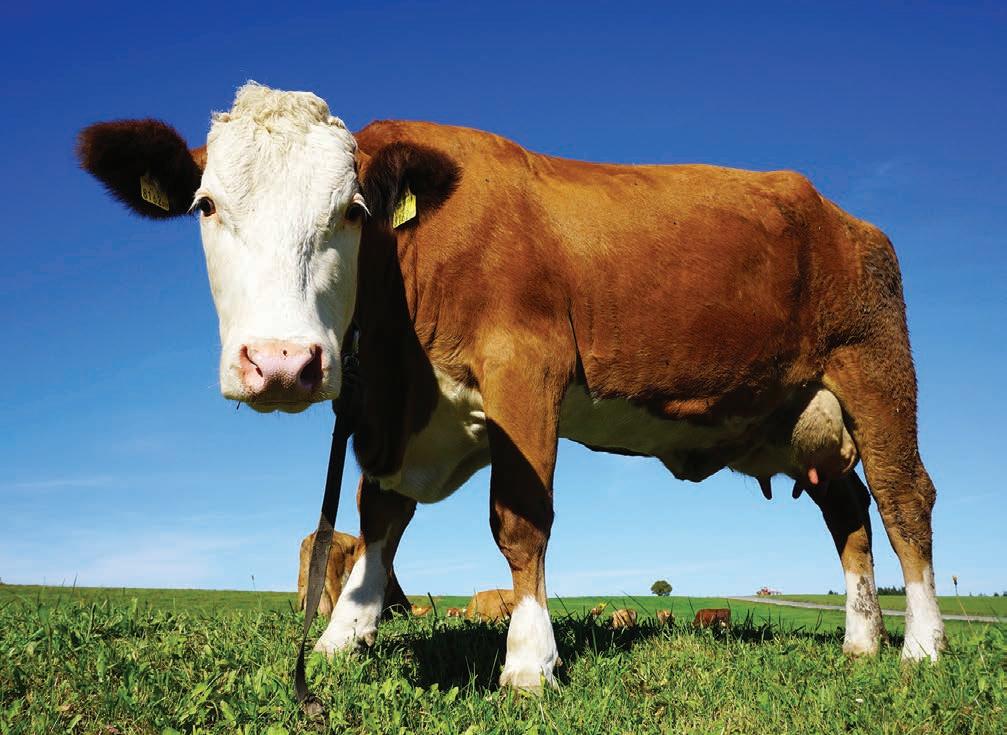
RESILIENCE FOCUS: Scientists say the advance could be used to help farmers rear animals with enhanced traits, such as resistance to diseases or heat tolerance.
SCIENTISTS have produced geneedited livestock using a technique which they say could lead to healthier animals and more sustainable meat production.
The researchers from universities in the UK and the US used the Crispr-Cas9 gene-editing tool to remove a male fertility gene
A DELAY in securing “third country” status with the EU is putting the UK’s £175 milliona-month (about NZ$336.5m) meat export market at risk, meat trade representatives have warned.
To continue selling meat, live animals and other food products into the EU after
December 31, the UK will need a third country listing – as a whole and possibly for individual processing plants.
But the British Meat
Processors Association (BMPA) is concerned that the EU may delay approval of third country listing for the UK, or require individual site inspections.
“While a request has been submitted by the UK, there is currently no firm indication as to when the EU will consider and vote on formal country approval, let alone when and if plant inspections will be done,”BMPA chief executive
Nick Allen said.
The BMPA says the UK needs third country status approved now to allow UK exporters to hold on to existing EU customers – some of whom pre-order three to four months in advance. in the embryo in pigs, goats, cattle and mice.
The male animals were born sterile, but otherwise healthy, and they began producing their own sperm after being injected with stem cells that produce only desired sperm from the donor’s
REQUIRED: The BMPA says the UK needs third country status approved now to allow UK exporters to hold on to existing EU customers.
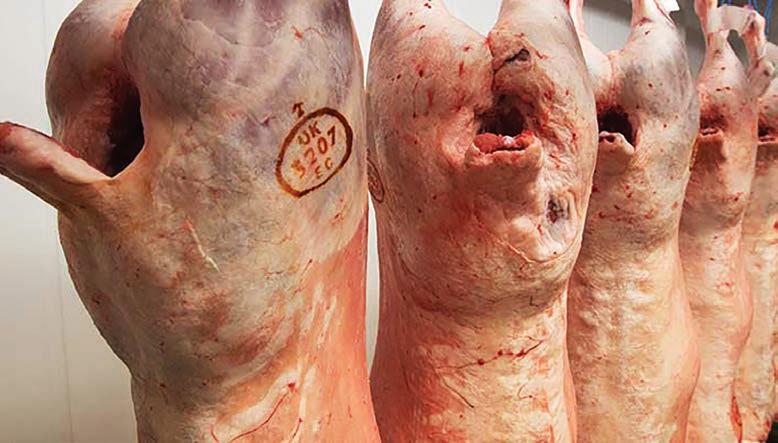
genetic material.
The EU’s chief negotiator Michel Barnier says there are still “many uncertainties” about the UK’s food standards regime that could lead to the bloc banning all imports of UK produce from January 1, and “more clarity” is needed.
Prime Minister Boris Johnson’s apparent willingness to relax import rules and standards in order to secure a trade deal with the US may have prompted the EU to re-assess the third country approval it gave the UK in August last year.
“It’s highly unlikely that the EU will refuse us third country status,” Allen said.
“The bigger question is when it will be granted and how much damage to our food businesses and supply chains will be done in the process.”
New export certification requirements and the uncertainty over Health Marks that have not yet been addressed by the UK government are other areas that could prevent the UK from exporting product to the EU from January 1, the BMPA noted.
UK Farmers Weekly
The surrogate mice fathered healthy offspring that carried the genes of the donor mice and they were confirmed to have active donor sperm. However, the larger animals have not been bred yet.
Scientists say the advance could be used to help farmers rear animals with enhanced traits, such as resistance to diseases or heat tolerance, and improve food production for an increasing global population.
The surrogate sires technology – also dubbed super dads – could be used to sire elite offspring such as healthier cows with better quality meat.
Researchers say it could also create a new option for genetic conservation of endangered species.
“With this technology, we can get better dissemination of desirable traits and improve the efficiency of food production. This can have a major effect on SHIPMENTS of beef will be heading to the US for the first time in more than 20 years after three processing sites were this week given the go-head to export.
The AHDB says first containers of beef are now being prepared and are due to arrive in the US in the coming weeks.
The businesses are based in Northern Ireland and Wales and have now been listed by the US Department of Agriculture’s Food Safety Inspection Service.
The US announced plans to lift its 24-year ban on British beef imports in March following a three-week inspection during summer 2019.
The UK government has welcomed the move, saying it opens the door to an estimated £66 million (about NZ$126.3m) of export opportunities for farmers over the next five years.
British beef had been banned in the US since 1996 following an outbreak of bovine spongiform encephalopathy (BSE).
AHDB international market development director Phil Hadley says it was “an historic moment” for UK livestock farmers. addressing food insecurity around the world,” lead researcher Jon Oatley, a biologist at Washington State University’s (WSU) College of Veterinary Medicine, said.
“If we can tackle this genetically, that means less water, less feed and fewer antibiotics we have to put into the animals,” he said.
The study, published in the Proceedings of the National Academy of Sciences, is the result of six years of collaborative work from researchers at WSU, Utah State University, University of Maryland and the Roslin Institute at the University of Edinburgh, which previously created the world’s first cloned animal, known as Dolly the sheep.
Prof Bruce Whitelaw of the Roslin Institute says the study provides a powerful proof-ofconcept tool.
“This shows the world that this technology is real. It can be used,” he said.
to the sector.
“We are rightly proud of our industry, which has a reputation for producing high-quality beef to some of the best welfare standards in the world,” he said.
“The US represents an important potential market for our red meat exports, and this development is the result of the hard work and persistence of
“We now have to go in and work out how best to use it productively to help feed our growing population.”
Scientists have been searching for a way to create surrogate sires for decades to overcome the limitations of selective breeding and artificial insemination – tools that require either animal proximity or strict control of their movement. In many cases, they require both.
According to the study, the surrogate sire technology could solve those problems, since the surrogates deliver the donor genetic material the natural way through normal reproduction. This enables farmers to let their animals interact normally in the field.
However, current government regulations prevent these geneedited animals from entering the food chain.
US lifts 24-year ban on UK beef imports
OPPORTUNITIES: AHDB international market development director Phil Hadley described the ban lift as an important milestone that will bring a fantastic boost
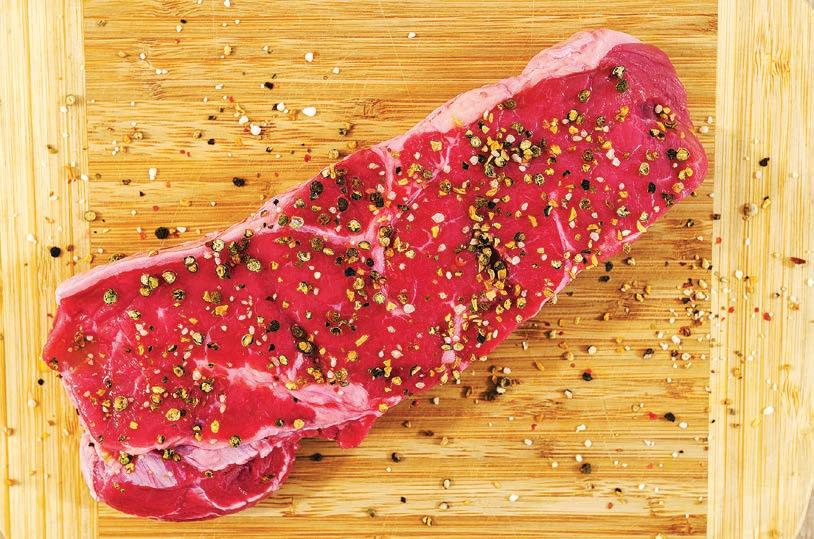
UK Farmers Weekly
industry and government to bring about this crucial next step.
“This important milestone will bring a fantastic boost to the sector and we look forward to seeing more of our red meat served up on dinner tables across the US in the months and years to come.”








